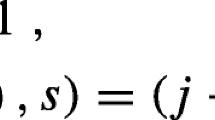Abstract
Modelling multi-tasking behaviour is an important phase of real-time system design. It is shown how task scheduling principles can be captured in a CCS-based process algebra via extensions for both asymmetric interleaving, to model intraprocessor scheduling decisions, and for asynchronous communication, to model interprocessor precedence constraints. Examples are given of task preemption, blocking on shared resources, and multi-task transactions.
Access this chapter
Tax calculation will be finalised at checkout
Purchases are for personal use only
Preview
Unable to display preview. Download preview PDF.
Similar content being viewed by others
References
L. Aceto and D. Murphy. Timing and causality in process algebra. Acta Informatica, 33:317–350, 1996.
N. Audsley, A. Burns, M. Richardson, K. Tindell, and A. Wellings. Applying new scheduling theory to static priority pre-emptive scheduling. Software Engineering Journal, 8(5):284–292, September 1993.
H. Ben-Abdallah, J.-Y. Choi, D. Clarke, Y. S. Kim, I. Lee, and H.-L. Xie. A process algebraic approach to the schedulability analysis of real-time systems. Real-Time Systems, 15:189–219, 1998.
S. Bornot, J. Sifakis, and S. Tripakis. Modeling urgency in timed systems. In W.-P. de Roever, H. Langmaack, and A. Pnueli, editors, Compositionality: The Significant Difference, volume 1536 of Lecture Notes in Computer Science, pages 103–129. Springer-Verlag, 1998.
L. Breveglieri, S. Crespi-Reghizzi, and A. Cherubini. Modeling operating systems schedulers with multi-stack-queue grammars. In G. Ciobanu and G. Păun, editors, Fundamentals of Computation Theory (FCT’99), volume 1684 of Lecture Notes in Computer Science, pages 161–172. Springer-Verlag, 1999.
G. C. Buttazzo. Hard Real-Time Computing Systems: Predictable Scheduling Algorithms and Applications. Kluwer, 1997.
J. C. Corbett. Timing analysis of Ada tasking programs. IEEE Transaction on Software Engineering, 22(7):461–483, July 1996.
J. S. Dong, N. Fulton, L. Zucconi, and J. Colton. Formalising process scheduling requirements for an aircraft operational flight program. In Proc. IEEE International Conference on Formal Engineering Methods (ICFEM’97), pages 161–169. IEEE Press, November 1997.
J. D. G. Falardeau. Schedulability analysis in rate monotonic based systems with application to the CF-188. Master’s thesis, Department of Electrical and Computer Engineering, Royal Military College of Canada, May 1994.
C. J. Fidge and J. J. Žic. An expressive real-time CCS. In Proc. Second Australasian Conference on Parallel and Real-Time Systems (PART’95), pages 365–372, Fremantle, September 1995.
P.-A. Hsiung, F. Wang, and Y.-S. Kuo. Scheduling system verification. In W. R. Cleaveland, editor, Tools and Algorithms for the Construction and Analysis of Systems (TACAS’99), volume 1579 of Lecture Notes in Computer Science, pages 19–33. Springer-Verlag, 1999.
D. M. Jackson. Experiences in embedded scheduling. In M.-C. Gaudel and J. Woodcock, editors, FME’96: Industrial Benefit and Advances in Formal Methods, volume 1051 of Lecture Notes in Computer Science, pages 445–464. Springer-Verlag, 1996.
J. Jacky. Analyzing a real-time program in Z. In Proc. Z User’s Meeting (ZUM’98), 1998.
Z. Liu, M. Joseph, and T. Janowski. Verification of schedulability for real-time programs. Formal Aspects of Computing, 7(5):510–532, 1995.
R. Milner. Communication and Concurrency. Prentice-Hall, 1989.
M. Minea. Partial order reduction for model checking of timed automata. In J. C. M. Baeten and S. Mauw, editors, CONCUR’99: Concurrency Theory, volume 1664 of Lecture Notes in Computer Science, pages 431–446. Springer-Verlag, 1999.
R. van Glabbeek and P. Rittgen. Scheduling algebra. In A. M. Haeberer, editor, Algebraic Methodology and Software Technology (AMAST’98), volume 1548 of Lecture Notes in Computer Science, pages 278–292. Springer-Verlag, 1999.
R. J. van Glabbeek. The meaning of negative premises in transition system specifications II. In F. Meyer auf der Heide and B. Monien, editors, Automata, Languages and Programming, 23rd International Colloquium, volume 1099 of Lecture Notes in Computer Science, pages 502–513. Springer-Verlag, 1996. Extended abstract.
Z. Yuhua and Z. Chaochen. A formal proof of the deadline driven scheduler. In H. Langmaack, W.-P. de Roever, and J. Vytopil, editors, Formal Techniques in Real Time and Fault Tolerant Systems, volume 863 of Lecture Notes in Computer Science, pages 756–775. Springer-Verlag, 1994.
Author information
Authors and Affiliations
Editor information
Editors and Affiliations
Rights and permissions
Copyright information
© 2000 Springer-Verlag Berlin Heidelberg
About this paper
Cite this paper
Fidge, C.J. (2000). The Algebra of Multi-tasking. In: Rus, T. (eds) Algebraic Methodology and Software Technology. AMAST 2000. Lecture Notes in Computer Science, vol 1816. Springer, Berlin, Heidelberg. https://doi.org/10.1007/3-540-45499-3_17
Download citation
DOI: https://doi.org/10.1007/3-540-45499-3_17
Published:
Publisher Name: Springer, Berlin, Heidelberg
Print ISBN: 978-3-540-67530-3
Online ISBN: 978-3-540-45499-1
eBook Packages: Springer Book Archive




